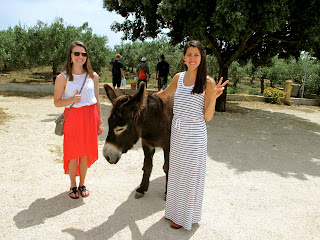I think one of the things that fascinates me the most from
our tours is not necessarily the product or the process, but the longevity of
the companies. Don’t get me wrong, I totally appreciate the process and the
work that goes into these products, but when a company tells us when it was
founded or that it’s a family company, that almost shapes my opinion of the
company even more. Maybe it’s because my dad is part of a family company that
his grandfather started, so I have a deeper appreciation for that dynamic in a
company.
For example, the honey company we went to on Monday was
started in 1983, and we got to see how the family worked together. The
patriarch is the one who gave us the tour, explaining how they have 600-700
hives and the hives are put in groves 10 acres in diameter so they only
pollinate one type of flower (i.e. orange, lemon, eucalyptus, multi-flower, or
chestnut). Then he showed us the extraction process as his wife worked the
machinery: the frames with wax and honey are put on the assembly line, and the
first step removes the outer wax so that the honey can drip off. Then comes the
centrifuge step with frames 9x12 and the honey comes out. It’s a big piece of
machinery that you know was a large investment for a small family company, but
it’s totally paid off. In an eight-hour day they produce three tons of honey
with two people working. The family really only needs itself. The wife was so
excited to talk about the process with us, and the daughter was the one in
charge of the taste testing. They work together well and they’re successful.
Honestly, that stop was one where we stayed an unusually long time after the
tour was over so I went outside with a couple of the girls to hang out with
Millie and Paul. That ended up being a really fun thing because we got to know
them better and talk about things like Millie’s research and their dog. But,
even though they lost me at the end, that stop was still so memorable for me,
purely for the fact that they do it as a family.
 |
| The patriarch explaining the cooling process |
 |
| The 9x12 honeycomb entering centrifugation step |
The olive tree grove we stopped at on Thursday was another
example of a family business. The lady in charge told us how it used to be a
vineyard, but then her father made the risky decision to switch to olive trees
to make olive oil. They now have acres filled with trees ranging from 5-70
years old and produce an award-winning olive oil product. While she gave us a
tour in the field, her elderly father came out and listened to his daughter,
the new manager of the company. He would occasionally nod approvingly or add a
random interjection, and while he listened he would prune dead leaves off of
trees around him. Seeing the two of them interact and seeing him still caring
about his product made me appreciate that place so much more.
 |
| Molly and I made friends with the donkey |
 |
| The third-generation manager of the grove |
Seeing the family companies is such a sweet thing to witness.
These families have a bond most families don’t understand, because it’s beyond
just being related. You have to work together for your livelihood. The
companies that had that additional element were by far my favorite.
-Courtney Catalani
No comments:
Post a Comment
Your comment will appear if approved. Thank you.